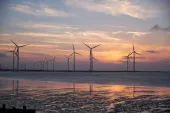
POSCO E&C to build world's first underground combined cycle power plant
Its capacity is pegged at 800MW.
According to a release, POSCO E&C (vice-chairman & CEO Chung Dong-Hwa) announced that it would construct an underground combined cycle power plant(CCPP), the first time such a feat has been attempted.
POSCO E&C will construct Seoul CCPP Units 1 and 2 with the capacity of 800MW (400MWx2) and heat production of 530Gcal/h on the site of the Seoul thermal power plant which was Korea's first thermal power plant built in 1930. The project is set for completion in September 2016.
The Seoul thermal Power Plant Units 1, 2 and 3 were all demolished by 1982 as they were built in the 1930s or 1950s, with only the 380,000KW Units 4 and 5 currently in operation on a limited part of the site. Once POSCO E&C completes the construction of the new Units 1 and 2, the existing Units 4 and 5 will cease to be in service and are to be remodeled into a creative cultural place by 2018.
The Seoul CCPP Unit 1 and 2 are the world's first CCPP that is built under the center of the city. Power generation facilities will be placed under the ground, while the ground area will become a combined cultural complex for local residents, and will feature an eco-park, sports facilities, performance facilities and a library. In particular, the observatory that will be built by utilizing the smokestack of the power plants is expected to become a new landmark of Mapo-gu, Seoul.
What matters the most in order to build the new plant under the ground is to create an underground space five times bigger than a soccer field.
"To excavate an area of 194m in width and 164m in length with an average depth of 25m, we need to take around 40,000 25-ton truckloads of earth out of the site. Moreover, we need to install perfect barrier walls as the plants will be located near the Han River. Thus we will concentrate our efforts on the civil engineering work," said a member from POSCO E&C.
Once the Seoul CCPP Units 1 and 2 commence their commercial operation, they will supply electricity to 800,000 households and district heating to 100,000 households across Seoul.
This latest project follows a string of successes already achieved by POSCO E&C in the various CCPP projects it has participated in both at home and abroad, including the LNG-fired CCPP EPC project for the Pohang Works. In particular, the company has been highly appraised for its technical capability as an energy plant leader in Latin America, following its successful completion of the construction of the 830MW Kallpa CCPP and the 810MW Chilca Uno CCPP, orders which the company won from the Peruvian market in Latin America, a first among Korean construction companies.



















 Advertise
Advertise







